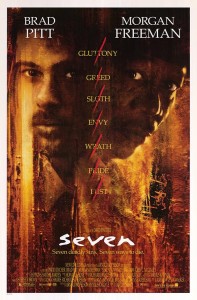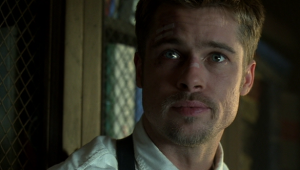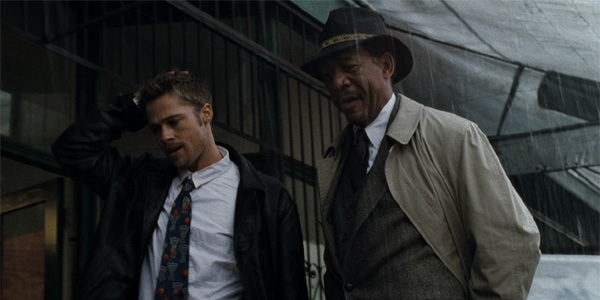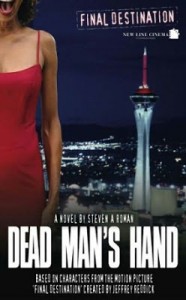 Today is the 20th anniversary of the day that Se7en—the 1995 crime thriller directed by David Fincher (Fight Club, Gone Girl), written by Andrew Kevin Walker (8MM, Sleepy Hollow), and starring Brad Pitt, Morgan Freeman, and Gwyneth Paltrow—debuted in movie theaters. So the time couldn’t be better for another installment of Tales of Development Hell, a series of blog entries that examine projects in which I was involved…but which never made it past the development stage.
Today is the 20th anniversary of the day that Se7en—the 1995 crime thriller directed by David Fincher (Fight Club, Gone Girl), written by Andrew Kevin Walker (8MM, Sleepy Hollow), and starring Brad Pitt, Morgan Freeman, and Gwyneth Paltrow—debuted in movie theaters. So the time couldn’t be better for another installment of Tales of Development Hell, a series of blog entries that examine projects in which I was involved…but which never made it past the development stage.
The city was a shithole—always had been, always would be. A festering sore from which hatred and perversion and indifference oozed like pus. It flowed through the streets, permanently staining whatever it touched. It filled the air with the acrid stench of blood and gunpowder and death.
And the mouth with the bitter taste of a life wasted.
In previous installments of ToDH, I’ve discussed novels I had been hired to write, only to see them get canceled along the way. This time we’re taking a look at Se7en: Sins of the Flesh, an original novel I was hired to write that would have been a sequel to that incredible movie. Only it didn’t work out quite the way anybody expected…
We open on a murder in progress: a homeless woman slowly being strangled to death. The point of view is that of the killer’s. Despite the viciousness of the crime—and the sense of power it should incite—he apparently derives no sexual pleasure from the act. He feels no malice toward his victim; rather, he believes he’s rescuing her from the indifference of a cold world—as he tightens the knot in the ligature…
In 2004, I was contacted by a former Simon & Schuster sales representative named Vince Rospond, who’d left S&S to become the U.S. sales rep for a British role-playing-game publisher called Games Workshop—RPGers may know them as the folks behind the Warhammer, Warhammer 40,000, and Lord of the Rings strategy games. Games Workshop’s book division, BL Publishing, had recently launched a new imprint: Black Flame, which would specialize in original novels based on popular licenses. Since I’d written three bestselling X-Men novels (The Chaos Engine Trilogy), Vince thought I’d be a good fit for Black Flame and put me in touch with the publisher.
The publisher explained they’d cut a deal with New Line Cinema to publish novels based on their movie franchises Friday the 13th (and its sci-fi spinoff, Jason X), A Nightmare on Elm Street, Final Destination…and Se7en. Okay, Se7en wasn’t really a franchise, but New Line had hopes of turning it into one. Naturally, my first response was “What’ll the sequel be called—Ei8ht?” (Go ahead and groan—in 2004, it was funny!) Lame jokes aside, he asked if I’d be interested in doing the Se7en novel—all their other authors were focused on creating the further adventures of Jason Voorhees and Freddy Kruger.
Even though I’d never seen Se7en, my immediate reaction was to say, “Absolutely!”—and then make a note to myself, reminding me to buy a DVD copy of it. The publisher and I then discussed terms for the project—the amount of the advance I’d be paid, delivery dates, etc.—and the next day he e-mailed me a contract. Now it was time to buy that DVD…
I spent the next few days studying the film, jotting down notes while it ran so I’d develop a feel for the characters’ descriptions and physical quirks, the unnamed city in which the story was set, and other observations that would help make the novel more three-dimensional. Then I ran the movie again, this time with the commentary tracks turned on, to gather more information. Finally, I bought a copy of the BFI Modern Classics book Seven, Richard Dyers’s analysis of the film. That, and the multiple viewings, provided me with a lot of insight to the world created by Andrew Kevin Walker.
Then it came time to start formulating a plot…
 Morning comes to the apartment of David Mills. After the events of Se7en, we find that he’s returned to his former home “upstate”—the unnamed city or town he and his late wife, Tracy, moved from when he transferred to the equally unnamed metropolis in the movie. Two years after killing John Doe, Mills is a different man, as should be expected: he constantly lives with the guilt of failing to protect Tracy, and with the knowledge that he allowed Doe to goad him into killing the suspect—thus helping him to carry out the last of the “Seven Deadly Sins” murders (Doe, Envious of the detective’s life, made Mills Wrathful by cutting off Tracy’s head and delivering it to him in a box). Add to that having to undergo psychiatric help to get him through that tragedy, standing trial for second-degree murder—for which the jury found him not guilty (justifiable homicide, in their eyes)—and losing his job on the police force, and the brash, cocky Detective Mills has given way to David Mills, Private Investigator.
Morning comes to the apartment of David Mills. After the events of Se7en, we find that he’s returned to his former home “upstate”—the unnamed city or town he and his late wife, Tracy, moved from when he transferred to the equally unnamed metropolis in the movie. Two years after killing John Doe, Mills is a different man, as should be expected: he constantly lives with the guilt of failing to protect Tracy, and with the knowledge that he allowed Doe to goad him into killing the suspect—thus helping him to carry out the last of the “Seven Deadly Sins” murders (Doe, Envious of the detective’s life, made Mills Wrathful by cutting off Tracy’s head and delivering it to him in a box). Add to that having to undergo psychiatric help to get him through that tragedy, standing trial for second-degree murder—for which the jury found him not guilty (justifiable homicide, in their eyes)—and losing his job on the police force, and the brash, cocky Detective Mills has given way to David Mills, Private Investigator.
It’s winter, and Christmas is only a short time away. But Mills feels no joy, only a dull emptiness. Wearily, he stumbles from bed to begin his day.
Meanwhile, in “The City,” the sun finds Lieutenant William Somerset resting comfortably—a man at peace with himself, if not the world. The John Doe murders, and the effects they had on Mills, seemingly reinvigorated Somerset’s resolve to continue fighting the good fight—a resolve that had severely dwindled before the events of the film. He still believes, as Ernest Hemingway said, “the world is…worth fighting for”—but still doesn’t consider it “a fine place.” And yet, life is not all black and white for him anymore.
He rises and starts getting ready for work. He looks forward to the holidays; there’s a peace to the season—a sense of the world pausing to catch its breath before the New Year arrives.
And then the phone rings.
 For this sequel, repeating the John Doe killings of the film, or doing something similar to them, would be a waste of everyone’s time. I needed a different sort of serial killer to bring Mills and Somerset back together—and then I remembered the myths of the sin-eater: a person who takes on the sins of others so the secondary party can pass on to the afterlife, free of sin. So what we’d have was a killer roaming The City, murdering people to absolve them of their “sins,” and freeing them from the urban-environment cesspool in which they’d been trapped. Because even death was far better than living in The City.
For this sequel, repeating the John Doe killings of the film, or doing something similar to them, would be a waste of everyone’s time. I needed a different sort of serial killer to bring Mills and Somerset back together—and then I remembered the myths of the sin-eater: a person who takes on the sins of others so the secondary party can pass on to the afterlife, free of sin. So what we’d have was a killer roaming The City, murdering people to absolve them of their “sins,” and freeing them from the urban-environment cesspool in which they’d been trapped. Because even death was far better than living in The City.
The title Sins of the Flesh popped up in my head almost immediately. Fantastic! I had a title and a murderer; now it was time to really get to work.
A week or so later, the publisher e-mailed me, asking about my progress. I gave him a rough idea of what I’d been planning, then added:
But the story needs a twist, right? I mean, we can’t just redo the movie with another serial killer—the big reveal has to come completely out of left field and shock the reader. So here’s what I’ve got in mind:
Brad Pitt is the killer.
Well, it certainly caught the publisher by surprise.
It’s good, right? I e-mailed. I mean, after everything his character went through in the movie, we saw at the end that he was a broken man. So after he gets out of the mental health hospital he wound up in, he wants to take revenge on the city for destroying his life. And so it turns out that the killer Morgan Freeman’s looking for is his old partner!
His response: That sounds like a really interesting angle…but I don’t think New Line’s going to go for that.
But, I wrote, it’s not like they’re ever going to turn it into a movie, right?
You never know, he wrote back. And if they did develop it, there’s no way they’d agree to make Pitt the killer. He’d be the leading man; they’d never allow him to be the killer.
Really? He could sell the hell out of it, I wrote.
He probably could, the publisher agreed, but they’d still never go for it.
So it was back to square one. I started reworking the pitch, even wrote a brief sample to try and get a feel for the material, but it seemed to be taking more effort than normal for me to come up with a revised plot. Had I lost interest because my Brad Pitt idea had been shot down? That might have been part of it, but eventually I realized what the problem was: for something as dark and bleak as a Se7en sequel would have to be, I was the wrong writer for the project.
I e-mailed the publisher. I can do dark, I explained, but I can’t do deep, oppressive black—I just don’t have the headspace for it. The screenplay for Se7en came from a very angry place in Walker, inspired by a period when he’d lived in New York, and, well…I just didn’t hate my hometown as much as he apparently did. Not to mention I just couldn’t get into the grotesque thought processes required for a serial killer. I’m a bad fit, I told the publisher. Sorry about that.
That’s okay, he said, and expressed appreciation for my honesty. Then he added that a complication had arisen while I was trying to create a workable plot—a complication that was going to derail the project.
If I correctly understood the explanation I was given, New Line had been developing a movie sequel—which, now years and numerous revisions later, has become the upcoming Anthony Hopkins–starring psychic thriller Solace—and Walker had objected to Se7en being turned into a franchise. (Hey, who can blame him? Why mess up a good thing?) So New Line shelved the movie sequel. And as for my novel… In the end, the publisher told me, “we would have had to kill the book anyway.”
Mills’s fist struck the edge of the autopsy table before he’d even realized his hand was in motion. The sound reverberated around the quiet room.
“Fuck!” he barked. His lips pulled back in a snarl, and he glared at the floor, feeling the frustration build. With an effort, he forced it back down—if he wasn’t careful, that goddamned temper of his was going to get him in trouble…again. He closed his eyes a moment, exhaled slowly, and agitatedly rubbed a hand through his unruly hair.
“Who’s the primary on the case?” he finally asked.
“Lieutenant Somerset,” the coroner replied.
A small, nervous laugh—he couldn’t help himself. “Son of a bitch…” he muttered through a half smile, and shook his head. “Somehow, I knew you were gonna say that…”
 But things have a way of working out. Because I was so honest about my inability to deliver the sort of bleak manuscript that would do Se7en justice, I was offered the chance to get involved with another movie franchise: Final Destination. That resulted in my writing the novel Final Destination: Dead Man’s Hand, about Death stalking the Las Vegas Strip. Unlike Se7en, this was more in my wheelhouse, with the franchise’s penchant for sarcasm and macabre humor.
But things have a way of working out. Because I was so honest about my inability to deliver the sort of bleak manuscript that would do Se7en justice, I was offered the chance to get involved with another movie franchise: Final Destination. That resulted in my writing the novel Final Destination: Dead Man’s Hand, about Death stalking the Las Vegas Strip. Unlike Se7en, this was more in my wheelhouse, with the franchise’s penchant for sarcasm and macabre humor.
And licenses have a way of changing. In 2006, Zenescope Entertainment published Se7en, a miniseries that examined the film’s John Doe murders from the viewpoint (and notebooks) of John Doe himself. Not quite a sequel, not quite a prequel, more like a “during the events of” story. As for Black Flame, the division closed up shop in 2008 after a solid three-year run of novels.
If you’ve never seen Se7en, I highly recommend checking it out. Just don’t expect Brad Pitt to turn out to be the killer.
Interested in previous installments of Tales of Development Hell? Then check out the stories behind these could-have-been projects:
Battlestar Galactica: The New Young Warriors
“Horror Express” Movie Review: Part 1, Part 2
Law & Order: Part 1, Part 2
Speed Racer: Leviathan: Part 1, Part 2, Part 3
Spider-Man/Gambit
Teenage Mutant Ninja Turtles: The Jewels of Ishlanon







Pingback: Curious George and the Almost Graphic Novel | StarWarp Concepts
Pingback: Is the Ei8hth Deadly Sin a Psychic One? | StarWarp Concepts